2016新课标三维英语必修5 U5S3
高中英语必修五Unit-Three-New-WordsPPT课件
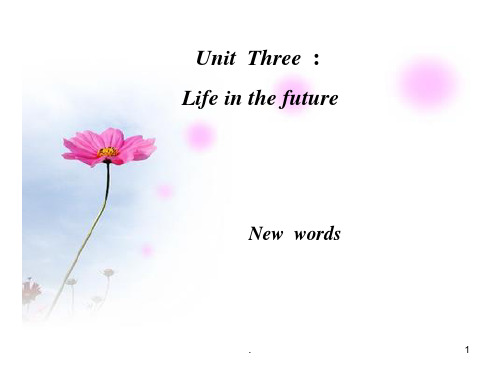
Unit Three : Life in the future
New words
.
1
1.impression: make / leave/have an impression on sb. give sb. an impression eg:Her excellent singing made a deep
.
13
in a flash 转瞬间,一瞬间;即刻
15. switch (n.)开关,转换
(make) a switch in ….
light switch
We had to make a switch in our arrangement .
(vt.) switch to ….
switch on
switch off
After having followed the thief for half an hour ,they lost sight of him in a large department store .
.
11
catch sight of
in /within sight
out of sight
Out of sight ,out of mind .
2)She has taken up a job as a teacher.
3)She took up the story that John didn’t finish .
Phrases:
take in
take off
2016新课标创新人教英语 必修五 Unit 3 Section 2
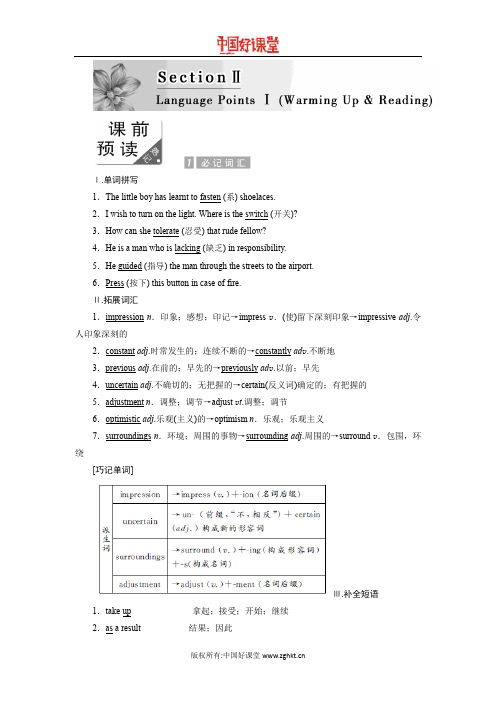
Ⅰ.单词拼写1.The little boy has learnt to fasten (系) shoelaces.2.I wish to turn on the light. Where is the switch (开关)?3.How can she tolerate (忍受) that rude fellow?4.He is a man who is lacking (缺乏) in responsibility.5.He guided (指导) the man through the streets to the airport.6.Press (按下) this button in case of fire.Ⅱ.拓展词汇1.impression n.印象;感想;印记→impress v.(使)留下深刻印象→impressive adj.令人印象深刻的2.constant adj.时常发生的;连续不断的→constantly ad v.不断地3.previous adj.在前的;早先的→previously ad v.以前;早先4.uncertain adj.不确切的;无把握的→certain(反义词)确定的;有把握的5.adjustment n.调整;调节→adjust v t.调整;调节6.optimistic adj.乐观(主义)的→optimism n.乐观;乐观主义7.surroundings n.环境;周围的事物→surrounding adj.周围的→surround v.包围,环绕[巧记单词]Ⅲ.补全短语1.take up拿起;接受;开始;继续2.as a result 结果;因此3.suffer from 患有(疾病等);为……受苦4.be similar to 与……相似5.(a) lack of ... 与……相似6.be back on one's feet (困境后)恢复;完全复原7.lose sight of ... 看不见……8.in all directions 向四面八方9.sweep up 打扫;横扫10.slide into(快捷而悄声地)移动;溜进……1.[教材原句]At first my new surroundings were difficult to tolerate.一开始新的环境让我很难忍受。
2016新课标三维英语必修5 U2S3
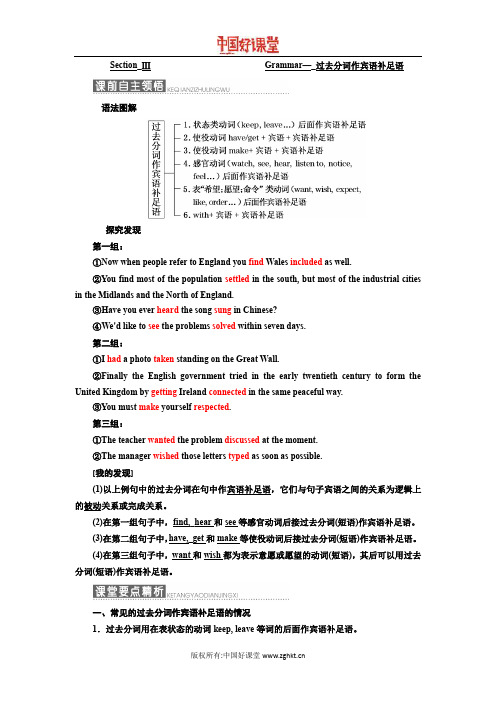
Section_ⅢGrammar—_过去分词作宾语补足语语法图解探究发现第一组:①Now when people refer to England you find Wales included as well.②You find most of the population settled in the south, but most of the industrial cities in the Midlands and the North of England.③Have you ever heard the song sung in Chinese?④We'd like to see the problems solved within seven days.第二组:①I had a photo taken standing on the Great Wall.②Finally the English government tried in the early twentieth century to form the United Kingdom by getting Ireland connected in the same peaceful way.③You must make yourself respected.第三组:①The teacher wanted the problem discussed at the moment.②The manager wished those letters typed as soon as possible.[我的发现](1)以上例句中的过去分词在句中作宾语补足语,它们与句子宾语之间的关系为逻辑上的被动关系或完成关系。
(2)在第一组句子中,find,_hear和see等感官动词后接过去分词(短语)作宾语补足语。
(3)在第二组句子中,have,_get和make等使役动词后接过去分词(短语)作宾语补足语。
2016新课标三维英语必修5 U3 单元小结
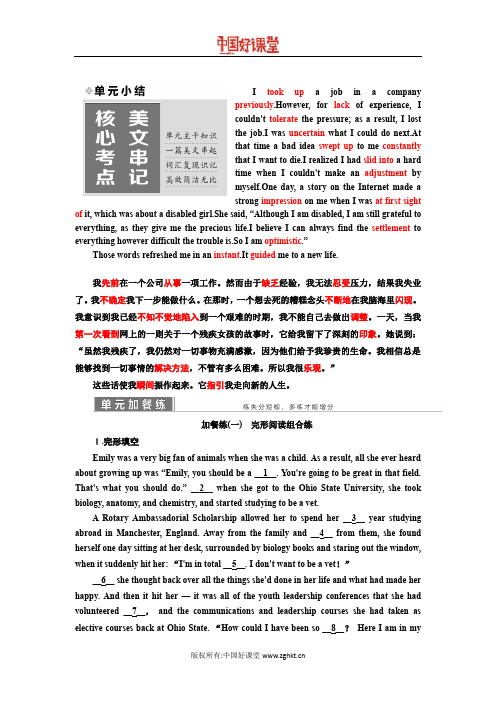
I took up a job in a companypreviously.However, for lack of experience, Icouldn't tolerate the pressure; as a result, I lostthe job.I was uncertain what I could do next.Atthat time a bad idea swept up to me constantlythat I want to die.I realized I had slid into a hardtime when I couldn't make an adjustment bymyself.One day, a story on the Internet made astrong impression on me when I was at first sight of it, which was about a disabled girl.She said, “Although I a m disabled, I am still grateful to everything, as they give me the precious life.I believe I can always find the settlement to everything however difficult the trouble is.So I am optimistic.”Those words refreshed me in an instant.It guided me to a new life.我先前在一个公司从事一项工作。
然而由于缺乏经验,我无法忍受压力,结果我失业了。
我不确定我下一步能做什么。
在那时,一个想去死的糟糕念头不断地在我脑海里闪现。
必修五 3.5《Unit 3 Life in the Future》 公开课一等奖课件PPT
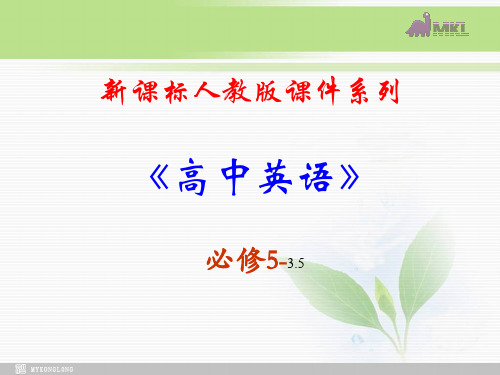
Read the last two paragraphs and answer the questions
H1.isWhohuastedisida WlaragnegbrPigihntg,'cslehaonursoeomlo.oIkt hlaikdea?green wall, a brown floor and soft lighting.
新课标人教版课件系列
《高中英语》
必修5-3.5
(1)
1.What's the difference between a monkey and a flea(跳蚤)? A monkey can have fleas, but a flea can't have monkeys.
2.What is black when it is clean and white when it is dirty? A blackboard.
2. What is a “time lag”?
“Time lag” means a person gets flashbacks from his previous time Period.
3. How did I feel when I was in the capsule?
The seats in the capsule are very comfortable.
shops attached; many blocks of
many services flats together;
(eg haircut) offered
floating parks for children
towns
Streets with markets, small shops and private houses
2016新课标创新英语 人教版 必修三 Unit 5 Section 5
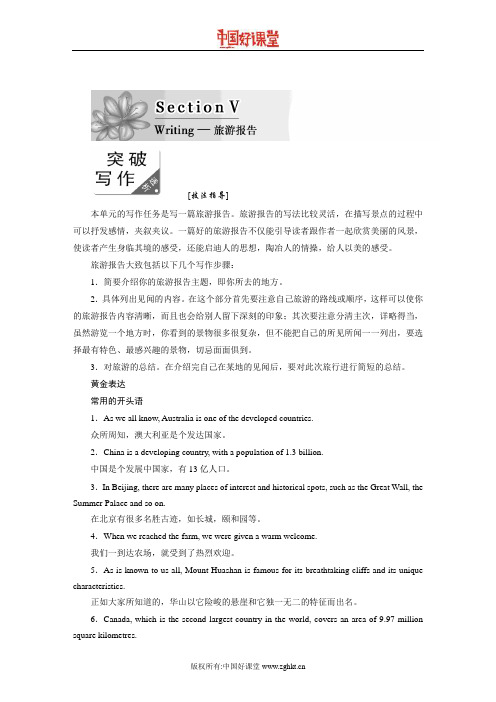
[技法指导]本单元的写作任务是写一篇旅游报告。
旅游报告的写法比较灵活,在描写景点的过程中可以抒发感情,夹叙夹议。
一篇好的旅游报告不仅能引导读者跟作者一起欣赏美丽的风景,使读者产生身临其境的感受,还能启迪人的思想,陶冶人的情操,给人以美的感受。
旅游报告大致包括以下几个写作步骤:1.简要介绍你的旅游报告主题,即你所去的地方。
2.具体列出见闻的内容。
在这个部分首先要注意自己旅游的路线或顺序,这样可以使你的旅游报告内容清晰,而且也会给别人留下深刻的印象;其次要注意分清主次,详略得当,虽然游览一个地方时,你看到的景物很多很复杂,但不能把自己的所见所闻一一列出,要选择最有特色、最感兴趣的景物,切忌面面俱到。
3.对旅游的总结。
在介绍完自己在某地的见闻后,要对此次旅行进行简短的总结。
黄金表达常用的开头语1.As we all know, Australia is one of the developed countries.众所周知,澳大利亚是个发达国家。
2.China is a developing country, with a population of 1.3 billion.中国是个发展中国家,有13亿人口。
3.In Beijing, there are many places of interest and historical spots, such as the Great Wall, the Summer Palace and so on.在北京有很多名胜古迹,如长城,颐和园等。
4.When we reached the farm, we were given a warm welcome.我们一到达农场,就受到了热烈欢迎。
5.As is known to us all, Mount Huashan is famous for its breathtaking cliffs and its unique characteristics.正如大家所知道的,华山以它险峻的悬崖和它独一无二的特征而出名。
2016新课标创新人教英语 必修五 Unit 3 Section 3
[语法初识][语法剖析]过去分词作状语,可以表示时间、让步、条件、原因、方式和结果,相当于一个状语从句。
其逻辑主语为主句的主语,且与主句主语之间构成逻辑上的动宾关系。
1.作时间状语。
相当于时间状语从句。
可在过去分词前加上连词“when, while, until”等,使其时间意义更明确。
(2012·安徽高考)When asked for his views about his teaching job, Philip said he found it very interesting and rewarding.当被问到对教学工作的观点时,菲利普说他觉得既有趣又有意义。
2.作原因状语。
相当于原因状语从句或并列结构。
(2015·天津高考)Absorbed in painting, John didn't notice evening approaching.专心于画画,约翰没有注意到时间是晚上了。
3.作条件状语。
相当于条件状语从句。
可加连词if, unless等转换成条件状语从句。
(2012·北京高考)Used with care, one tin will last for six weeks.如果用得仔细的话,一罐可以够用六周。
4.作让步状语。
相当于让步状语从句。
有时可加although, though, even if, even though, whether ... or等连词转换成让步状语从句。
Defeated by his opponent, he never gave up any hope.=Although he was defeated by his opponent, he never gave up any hope.尽管被对手击败,但是他从没放弃希望。
5.作方式、伴随状语。
相当于and连接的并列结构。
She accepted the gift, deeply moved.=She accepted the gift, and she was deeply moved.她接受了礼物,深深地被感动了。
新教材人教版高中英语必修三 U5 Discovering Useful Structures课件
I. Review of modal verbs
一、情态动词的语法特征
1.情态动词可以表示可能、建议、愿望、必要、 2. 允许、能力等。
3. 2.情态动词没有人称和数的变化。 4. 3.情态动词必须和实义动词一起构成谓语。
5.4.情态动词除ought和have外,后面只能接不带to的 不定式。
D. rห้องสมุดไป่ตู้quest E. advice
F. intention
Find modal verbs in previous sections and discuss their functions.
第十三页,共三十六页。
语法导学
感悟规律 重点难点剖析
感知以下课文原句,完成方框下的小题
语法感知
1.Oliver believes that with a million-pound bank note a man
plans are?
request
4.Well,you mustn’t worry about that.
necessity
5.Well,it may seem lucky to you but not to me!
6.Now if you’ll excuse me,I ought to be on my way.
• lose patience 失去耐心 • have no patience with 不能容忍
第六页,共三十六页。
2. postpone v. 延迟;延期;延缓 教材原句 He had to postpone opening it 他必须延迟打开它
要点必记
n. postponement 延期;延缓
2016-2017新课标三维人教英语总复习 人教 必修五 unit 3
Unit 3Life in the futureⅠ.单词—在语境中默写,在联想中积累1.typewriter n.打字机2.tablet n. 药片3.previous adj. 在前的;早先的4.uncertain adj. 不确切的;无把握的ck v i.&v t. 缺乏;没有n. 缺乏;短缺的东西6.exhausted adj. 筋疲力尽的;疲惫不堪的7.switch n. 开关;转换v t. 转换8.impression n.印象;感想;印记→impress v.使留下深刻印象→impressive adj.给人深刻印象的9.constant adj.时常发生的;连续不断的→constantly ad v.不断地10.surroundings n.周围的事物;环境→surrounding adj.周围的11.adjustment n.调整;调节→adjust v t.调整;调节12.press v i.&v t.按;压;逼迫n.按;压;印刷;新闻→pressure n.压力13.optimistic adj.乐观(主义)的→optimism n.乐观主义14.instant n.瞬间;片刻adj.立即的;立刻的→instantly ad v.立即;立刻15.settlement n.定居;解决→settle v.定居;解决→settler n.定居者bination n.结合;组合→combine v i.联合;结合1.Having no motivation(motivate) to study may be themost dangerous thing for astudent.2.They have decided to make afew adjustments (adjust) totheir travelling plan.3.They were both uncertain(certain) about what to do andwent to their uncle for help.4.As I walked through thetown, I was constantly(constant) reminded of mychildhood.5.His discovery was hardlycommented by thepress,_which gave him lesspressure.(press)6.When I first met him I gotthe impression that he was ashy man. That is what heimpressed me most.(impress)7.We are in instant need ofhelp. Please tell us instantlythey arrive.(instant)8.I always dream of having ahouse surrounded by trees andflowers. If we can live in suchbeautiful surroundings,_wemust have a happy feelingevery day. The surrounding1.-er后缀指物的名词小结①typewriter打字机②receiver 听筒;话筒③counter 柜台④drawer 抽屉⑤cooker 炊具⑥speaker 扬声器2.“药”之种种①tablet n.药片②pill n. 药片;药丸③drug n. 药④capsule n. 胶囊⑤traditional Chinesemedicine中药⑥western medicine 西药3.press家族①press v.&n. 按;压②pressure n. 压力③impress v. 留下印象④impression n. 印象⑤express v. 表达⑥expression n. 表达;表情4.“容忍”的各种表达①tolerate v t.忍受②bear v t. 忍受17.tolerate v t.容忍;忍受→tolerance n.容忍;宽容18.motivation n.动机→motivate v.成为……的动机things always have an effect onour mood.(surround)③stand v t. 忍受④put up with 忍受;容忍Ⅱ.短语—在应用中记牢,在归纳中记多1.take_up拿起;接受;开始;继续;占用2.suffer_from 患有(疾病等);为……受苦3.as_a_result 结果;因此4.be_greedy_for_... 对……贪婪5.(a)_lack_of ……方面的短缺6.be_back_on_one’s_feet (困境后)恢复;完全复原7.lose_sight_of_... 看不见……8.in_all_directions 向四面八方9.sweep_up 打扫;横扫10.slide_into (快捷而悄声地)移动;溜进……11.remind_sb._of_... 使某人想起……12.speed_up 加速1.I watched the plane go hig herand higher until I lost_sight_ofit.2.With the pace of modern lifespeeding_up,_instant food ismore and more popular.3.In the meantime, the lorrydriver had to sweep_uphundreds of broken bottles.4.Tom thought carefully forseveral days and decided totake_up the job.5.Nobody noticed when heentered the classroom; heslid_into it from the back door.6.She showed a_lack_ofresponsibility, so she lost thegood opportunity.1.“v.+from”短语荟萃①suffer from遭受②adapt from 从……改编③benefit from 从……中获益④date from 始于……⑤result from 因……而起⑥escape from 从……逃脱⑦die from 死于⑧hear from 收到某人的来信2.表示“结果;因此”的词汇大全①as a result②as a consequence③consequently④therefore/thusⅢ.句式—在解读中学懂,在仿写中学通1.Hit by a lack of fresh air, my head ached.由于缺乏新鲜的空气,我头痛。
人教新课标高中英语必修三课件:Unit5+Learn+about+language[1]
Meaning for -wards words
eastward(s) forward(s) upward(s) outward(s) downward(s) Backward(s)
to the east ahead, to the front to higher position / level out , in a direction away to lower position/level to the rear, to the back
Grammar
同位语从句
1. 概念: 在复合句中作名词的同位语的名词性从句。
2. 功能: 同位语从句对名词进一步解释,说明名词的
具体内容。
that 引导同位语从句
引导同位语从句的 that 在从句中不充当任 何成分,无任何具体意思,一般不省略。
e.g. (1) The news that our team won the first
The order that we received yesterday was that we should send a few people to help the other groups.
我们昨天收到的命令是我们应该派几个 人去帮助别的几个小组。
(定语从句, 是名词order的修饰语, that 在从句中作received的宾语, 可以省略)
2. This is the mountain village w__h_er_e I stayed last year.
3. The person to _w_h_o_m__ you spoke is a famous actor.
- 1、下载文档前请自行甄别文档内容的完整性,平台不提供额外的编辑、内容补充、找答案等附加服务。
- 2、"仅部分预览"的文档,不可在线预览部分如存在完整性等问题,可反馈申请退款(可完整预览的文档不适用该条件!)。
- 3、如文档侵犯您的权益,请联系客服反馈,我们会尽快为您处理(人工客服工作时间:9:00-18:30)。
Section ⅢGrammar—省略语法图解探究发现1.(You) Come in, please!2.John is a lawyer, and his wife (is) a cleaner.3. a.First degree burns turn white when (they are) pressed.b.If burns are on arms or legs, keep them higher than the heart, if (it is) possible.4. a.He is the man (who/whom/that) you can depend on.b.There is no doubt that John's quick thinking and the first aid skills (that/which) he learned at school saved Ms Slade's life.5.The boy wanted to play football in the street, but his mother did not allow him to (play football in the street).6. It shows (that) a knowledge of first aid can make a real difference.[我的发现](1)例句1为简单句中的省略。
(2)例句2为并列句中的省略。
(3)第1组例句为状语从句的省略。
当状语从句的主语和主句的主语指的是同一人或物,且由人称代词的主格担当,或当状语从句的主语为it,而且从句谓语中含有be动词时,可以把从句的主语和be动词一起省略。
(4)第2组例句为关系代词的省略。
当关系代词在限制性定语从句中作宾语时可以省略。
(5)例句5为不定式的省略。
有时可用不定式符号“to”来替代上文中出现的不定式。
(6)例句6体现的是当及物动词之后跟由连接词that引导的宾语从句时,that可以省略。
为了避免重复,或为了使句子更简练,在一些句子中常常省去一个或某几个成分,这种语法现象在英语中叫省略。
在英语句子中,常见的省略情况有以下几种:一、简单句中的省略1.省略主语:一般情况下,主语是不能省略的,但在祈使句和其他不容易引起歧义的情况下,特别是在口语中,主语常常省略,主要是祈使句中的you和疑问句中的主语。
(You) Shut up!住嘴!(You) Want a hand?需要帮忙吗?(I) Beg your pardon.请再说一遍。
(It) Doesn't matter.没关系。
2.省略宾语:当上、下或前后两个句子的宾语一致时,下句或后句常省略宾语。
—Do you know Miss Gao?—I don't know (her).——你认识高女士吗?——不认识。
3.省略主语和谓语(或谓语的一部分):在某些具体的场合下,主语和谓语都很明确,此时为了简化或显得亲切等,可将主语和谓语(或谓语的一部分)同时省略,只剩下表语、宾语、状语或其他成分。
(You come) This way, please.请这边走。
(省略了主语和谓语)(Have you) Got any ink?你有墨水吗?(省略了主语和谓语的一部分)[即时演练1]补全下列省略句①Have a seat, please!You_have_a_seat,_please!②Looks like rain.It_looks_like_rain.③Let's do the dishes. I'll wash and you dry.Let's_do_the_dishes._I'll_wash_and_you_dry_them/the_dishes.④Got any idea about the plan?Have_you_got_any_idea_about_the_plan?二、并列句中的省略在由and或but连接的并列句中,常省略一些重复的词或词组。
1.省略共同的主语或宾语。
Tom picked up a book on the floor and (Tom) handed it to his teacher.汤姆在地板上捡起了一本书并把它交给了老师。
2.若主语不同,而谓语部分的系动词、助动词或情态动词相同,则省略后面的系动词、助动词或情态动词。
Jack must have been playing football and Mary (must have been) doing her homework.杰克肯定一直在踢足球,玛丽肯定一直在做家庭作业。
3.若主语与谓语动词相同,则省略后面的主谓成分。
His advice made me happy, but (his advice made) Jim angry.他的建议使我高兴,却使吉姆生气。
4.若主语不同,但主要动词及后续部分相同,则省略主要动词及后续部分。
He has a knowledge of first aid but his friend doesn't (have a knowledge of first aid).他具备急救知识,但他朋友不具备。
[即时演练2]写出下列句中可以省略的部分①Some of us study Japanese, and others study English.others后的study②He gave up drinking several months, but he returned to his old way later.he③My friend didn't come to school, but I wonder why he/she didn't come to school.he/she_didn't_come_to_school三、复合句中的省略1.状语从句的省略(1)在when, while, if, as if, though, although, as, until, once, whether, unless, whenever 等连接的状语从句中,当从句主语跟主句的主语相同且从句谓语中含有系动词be或从句的主语为it时,则从句中主语和be动词常被省略。
Wood gives off much smoke while (it is) burning.木头燃烧时产生很多烟。
Whenever (it is) possible, they would stop him and ask him the three questions.只要有可能,他们就让他停下并问他这三个问题。
Will you be free this Sunday? If (it is) so, let's go camping.这个周日你有空吗?如果有,我们去野营吧。
[名师点津]省略句中的谓语动词和主语之间构成主动关系,则使用现在分词;若构成被动关系,则使用过去分词;若谓语动词表示的动作尚未发生,则使用不定式。
When (it is) heated, ice can be turned into water.加热的时候冰可以变成水。
(2)在than, as等引导的比较状语从句中常省略某些成分。
They don't use more water than (it is) necessary .他们使用的水没有超出需要量。
He runs as fast as Bob (runs).他和鲍勃跑得一样快。
[名师点津] 并非所有的状语从句都可以省略主语和be 动词,由after, before, because 等词引导的状语从句一般要改写成介词短语等,用动名词代替be 动词。
Because he was ill , he didn't attend the meeting.→Because of being ill , he didn't attend the meeting.(正)→Being ill , he didn't attend the meeting.(正)→Because ill , he didn't attend the meeting.(误)由于生病了,他没有出席会议。
[即时演练3] (1)用所给词的适当形式填空①When surfing (surf) the Internet, I downloaded the film.②(2015·湖南高考改编)Video games can be a poor influence if left (leave) in the wrong hands.③He opened his mouth as if to_say (say) something.(2)把下列句子改为省略句 ①If it is so, I hope you will have a wonderful time.→If_so,_I hope you will have a wonderful time. ②The winters in Hangzhou are not so mild as they are in Guangzhou.→The winters in Hangzhou are not so mild as_in_Guangzhou.2.定语从句的省略(1)在限制性定语从句中,作宾语用的关系代词whom, which, that 可省略(但whom, which 紧跟在介词后时不能省略)。
The exact year(which/that )Angela and her family spent together in China was 2008. 安哥拉和她的家人一起在中国度过的那一年是2008年。
(2)修饰way 的关系词that/in which 可以省略。
The way ⎩⎪⎨⎪⎧⎭⎪⎬⎪⎫in which that /he speaks to us is really annoying. 他对我们讲话的方式真是让人讨厌。
[即时演练4] 写出下列句中可以省略的部分 ①(2014·江西高考改编)Among the many dangers which sailors have to face, probably the greatest of all is fog.which②(2014·陕西高考改编)Please send us all the information that you have about the candidate for the position.that3.宾语从句的省略(1)及物动词后接宾语从句时,连接词that一般可以省略;但如果及物动词接两个或两个以上that引导的宾语从句,那么只有第一个that可以省略。
